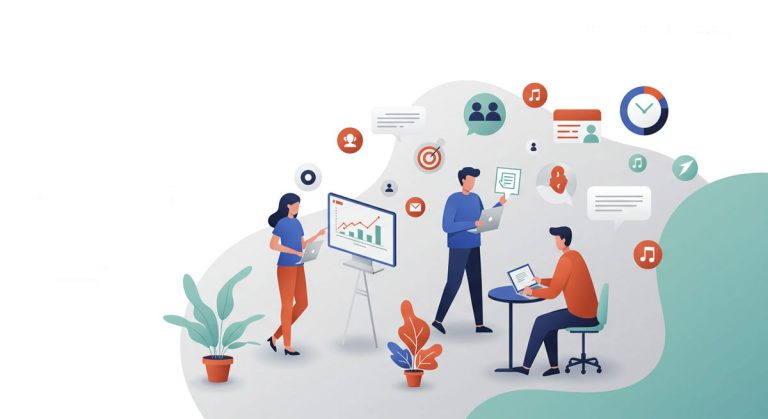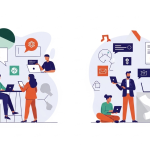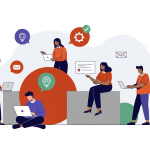My Wake-Up Call: How I Almost Got Scammed by AI (And What I Learned)
Okay, so… I never thought I’d be writing about cybersecurity on my blog, but after I almost fell victim to a terrifyingly realistic AI voice cloning scam last month, I have to share what I learned. I’m still kind of shaking my head at how close I came to falling for something that, looking back, seems so obvious.
The 2 AM Call: My Close Call with an AI Voice Cloning Scam
Picture this: It’s 2 AM, I’m cramming for my databases final (because of course I am), and my phone rings. It’s my mom’s voice, and she sounds… panicked? Like, really upset. She’s saying something about being in an accident, needing money for a lawyer, and please don’t tell dad because he’ll freak out.
And here’s the thing—it SOUNDED exactly like her. The little catch in her voice when she’s crying? The way she says “honey” when she’s stressed? All there.

But something felt… off? I can’t even explain it. Maybe it was because she was asking for Bitcoin (since when does my 50-year-old mom even know what Bitcoin is?), or maybe it was just that weird gut feeling you get sometimes.
I hung up and called her back immediately. She was asleep. In her bed. Totally fine.
That’s when I realized I’d almost become a victim of what I later learned was called “voice cloning fraud.” And honestly? It scared the hell out of me.
Going Down the Rabbit Hole (aka My New Obsession)
After that night, I became kind of obsessed with learning about this stuff. I mean, if someone could fake my mom’s voice that perfectly, what else were they capable of?
Turns out… a lot. And it’s way worse than I thought.
Deepfakes Are Getting Scary Good
Remember when deepfakes were those obviously fake videos of celebrities? Yeah, well, those days are over. The stuff I’ve seen now is absolutely terrifying. Like, there are scammers creating video calls where they literally look and sound like your boss, your family members, anyone.
I found this case study where a company lost $25 million because someone deepfaked their CEO’s voice and convinced the CFO to make an urgent wire transfer. TWENTY-FIVE MILLION DOLLARS. I can barely manage my $200 checking account balance, and these people are moving millions based on a fake voice.
It makes you question everything, you know? Like, can I ever trust a phone call again?

The Phishing Emails That Actually Fool People
And don’t even get me started on the phishing emails now. I used to think I was pretty good at spotting fake emails—you know, the obvious “Nigerian prince” stuff or the emails with terrible grammar.
But last week, I got an email that was supposedly from my university’s IT department. It mentioned my specific classes, my professor’s names, and even referenced a recent campus event I’d attended. The writing style matched perfectly with other emails from IT. I was literally hovering my cursor over the link when I thought, “Wait… let me just double-check this.”
Good thing I did. It was completely fake. But honestly? If I hadn’t been researching this stuff obsessively, I probably would have clicked.
Key Lessons: How to Protect Yourself from AI Scams
1. AI Is Fighting AI Now
This is actually kind of cool (in a terrifying way). There are these tools now—I found one called Vastav.AI—that can detect deepfakes in real-time by analyzing tiny facial movements and voice patterns that humans can’t even notice.
It’s like this weird arms race between good AI and bad AI. Makes me feel like I’m living in a sci-fi movie, except it’s my actual life.
2. My Voice Is Not Safe Anymore
This one really messed with my head. Apparently, hackers only need like 3-5 seconds of your voice to clone it now. Three seconds! I probably have hours of my voice on social media stories, video calls, voice messages…
I’ve basically stopped using voice authentication for anything important now. My bank kept pushing me to set up voice verification, and I was like, “Absolutely not.” They probably think I’m paranoid, but whatever.
3. Even My Typing Style Isn’t Safe
Okay, this is where it gets really weird. I learned about something called “behavioral biometrics”—basically, the way you type, move your mouse, even how long you pause between words can identify you.
Which is cool for security, I guess? But also means that hackers can potentially mimic even THAT. Like, nothing is sacred anymore.
Future AI Threats: Quantum Computing and Deepfake Evidence
Quantum Computing Is Coming for Our Encryption
So apparently, there’s this thing called “harvest now, decrypt later” where hackers are stealing encrypted data today with the plan to decrypt it once quantum computers get powerful enough.
Which means my “private” messages from today might not be private in 10 years. That’s… a lot to process.
My computer science professor mentioned we need to start using something called “post-quantum cryptography,” and honestly, I barely understand regular cryptography. The learning curve is steep, but I guess we all have to catch up fast.
The Legal System Is Struggling Too
Here’s something I didn’t expect: courts are having trouble figuring out what’s real evidence anymore. Like, imagine being falsely accused of something based on deepfake video evidence. How do you even prove it’s fake?
There are some new laws coming out—something called the TAKE IT DOWN Act—but it feels like the technology is moving faster than the legal protections.
What I’m Actually Doing About It (Beyond Panicking)
The Basics (That I Should Have Been Doing Already)
- Multi-factor authentication on EVERYTHING: I know, I know, it’s annoying. But getting scammed would be more annoying.
- Password manager: Finally bit the bullet and got one. My password used to be some variation of “password123” for way too many things. Don’t judge me.
- Regular software updates: I used to ignore those update notifications forever. Not anymore.
The New Stuff I’m Learning
- Questioning everything: If something feels urgent or too convenient, I pause and verify through a different channel.
- Zero-trust mindset: This is a fancy security concept, but basically it means “trust nobody and verify everything.” Sounds paranoid, but here we are.
- Media literacy: I’ve been practicing spotting deepfakes and AI-generated content. There are some good online tutorials for this.
Where This Leaves Me (And All of Us)
Look, I’m just a college student trying to figure out life, and now I have to worry about AI trying to trick me every day. It’s exhausting, honestly.
But here’s what I keep coming back to: we can’t just hide from this technology. It’s here, it’s evolving fast, and ignoring it won’t make it go away.
I’ve started thinking of it like defensive driving. You don’t drive scared, but you drive aware. You assume other drivers might do something unpredictable, and you prepare for it.
Same thing with AI threats. I can’t live in fear of every phone call or email, but I can stay alert and question things that seem off.
My Advice (For What It’s Worth)
I’m not an expert—I’m literally still learning this stuff as I go. But if my near-miss can help someone else avoid getting scammed, then sharing my story is worth the slight embarrassment of admitting I almost fell for a fake mom voice.
Trust your gut. If something feels weird, investigate. That weird feeling saved me $5,000 and a lot of heartache.
Stay curious, not paranoid. Learn about these threats, but don’t let them control your life.
Verify through different channels. If someone calls asking for money, hang up and call them back. If you get an urgent email, check it through another method.
And honestly? Talk to your family and friends about this stuff. My mom had no idea voice cloning was even possible until I told her about my experience. Now she knows to be suspicious if she gets weird calls from family members asking for money.
Final Thoughts
2025 has been a wild ride so far, and we’re only a few months in. The technology is incredible and terrifying at the same time. But I think if we stay informed, stay connected, and look out for each other, we can navigate this crazy digital world without losing our minds. Staying vigilant against AI scams is the new defensive driving for our digital lives.
Or at least, that’s what I’m telling myself as I try to focus on my actual studies instead of falling down another cybersecurity research rabbit hole at 3 AM.
Stay safe out there, everyone. And maybe give your parents a heads up about voice cloning scams. Trust me on this one.
Sometimes sharing these stories helps us all stay more aware.
Update: My mom texted me after reading this post saying she’s now suspicious of every phone call she gets. Oops? But better safe than sorry, right?





